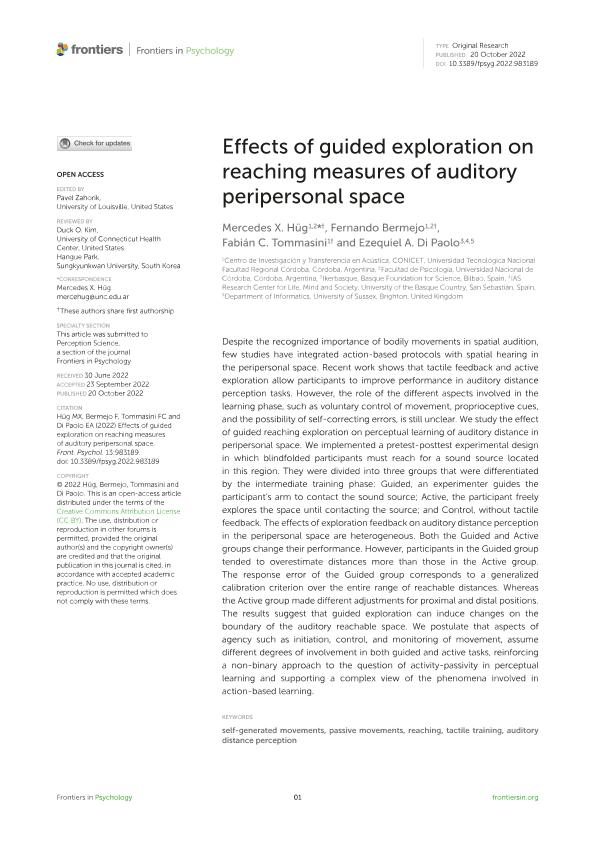Mostrar el registro sencillo del ítem
dc.contributor.author
Hüg, Mercedes X.
dc.contributor.author
Bermejo, Fernando Raul

dc.contributor.author
Tommasini, Fabián Carlos

dc.contributor.author
Di Paolo, Ezequiel Alejandro

dc.date.available
2023-08-17T11:33:31Z
dc.date.issued
2022-10-20
dc.identifier.citation
Hüg, Mercedes X.; Bermejo, Fernando Raul; Tommasini, Fabián Carlos; Di Paolo, Ezequiel Alejandro; Effects of guided exploration on reaching measures of auditory peripersonal space; Frontiers Media; Frontiers in Psychology; 13; 983189; 20-10-2022; 1-15
dc.identifier.issn
1664-1078
dc.identifier.uri
http://hdl.handle.net/11336/208558
dc.description.abstract
Despite the recognized importance of bodily movements in spatial audition, few studies have integrated action-based protocols with spatial hearing in the peripersonal space. Recent work shows that tactile feedback and active exploration allow participants to improve performance in auditory distance perception tasks. However, the role of the different aspects involved in the learning phase, such as voluntary control of movement, proprioceptive cues, and the possibility of self-correcting errors, is still unclear. We study the effect of guided reaching exploration on perceptual learning of auditory distance in peripersonal space. We implemented a pretest-posttest experimental design in which blindfolded participants must reach for a sound source located in this region. They were divided into three groups that were differentiated by the intermediate training phase: Guided, an experimenter guides the participant’s arm to contact the sound source; Active, the participant freely explores the space until contacting the source; and Control, without tactile feedback. The effects of exploration feedback on auditory distance perception in the peripersonal space are heterogeneous. Both the Guided and Active groups change their performance. However, participants in the Guided group tended to overestimate distances more than those in the Active group. The response error of the Guided group corresponds to a generalized calibration criterion over the entire range of reachable distances. Whereas the Active group made different adjustments for proximal and distal positions. The results suggest that guided exploration can induce changes on the boundary of the auditory reachable space. We postulate that aspects of agency such as initiation, control, and monitoring of movement, assume different degrees of involvement in both guided and active tasks, reinforcing a non-binary approach to the question of activity-passivity in perceptual learning and supporting a complex view of the phenomena involved in action-based learning.
dc.format
application/pdf
dc.language.iso
eng
dc.publisher
Frontiers Media

dc.rights
info:eu-repo/semantics/openAccess
dc.rights.uri
https://creativecommons.org/licenses/by/2.5/ar/
dc.subject
AUDITORY DISTANCE PERCEPTION
dc.subject
PASSIVE MOVEMENTS
dc.subject
REACHING
dc.subject
SELF-GENERATED MOVEMENTS
dc.subject
TACTILE TRAINING
dc.subject.classification
Psicología especial

dc.subject.classification
Psicología

dc.subject.classification
CIENCIAS SOCIALES

dc.title
Effects of guided exploration on reaching measures of auditory peripersonal space
dc.type
info:eu-repo/semantics/article
dc.type
info:ar-repo/semantics/artículo
dc.type
info:eu-repo/semantics/publishedVersion
dc.date.updated
2023-08-08T11:15:23Z
dc.journal.volume
13
dc.journal.number
983189
dc.journal.pagination
1-15
dc.journal.pais
Suiza

dc.journal.ciudad
Lausana
dc.description.fil
Fil: Hüg, Mercedes X.. Universidad Nacional de Córdoba; Argentina. Universidad Tecnológica Nacional. Facultad Regional Córdoba. Centro de Investigación y Transferencia en Acústica. - Consejo Nacional de Investigaciones Científicas y Técnicas. Centro Científico Tecnológico Conicet - Córdoba. Centro de Investigación y Transferencia en Acústica; Argentina
dc.description.fil
Fil: Bermejo, Fernando Raul. Universidad Nacional de Córdoba; Argentina. Universidad Tecnológica Nacional. Facultad Regional Córdoba. Centro de Investigación y Transferencia en Acústica. - Consejo Nacional de Investigaciones Científicas y Técnicas. Centro Científico Tecnológico Conicet - Córdoba. Centro de Investigación y Transferencia en Acústica; Argentina
dc.description.fil
Fil: Tommasini, Fabián Carlos. Universidad Tecnológica Nacional. Facultad Regional Córdoba. Centro de Investigación y Transferencia en Acústica. - Consejo Nacional de Investigaciones Científicas y Técnicas. Centro Científico Tecnológico Conicet - Córdoba. Centro de Investigación y Transferencia en Acústica; Argentina
dc.description.fil
Fil: Di Paolo, Ezequiel Alejandro. Universidad del País Vasco; España. Ikerbasque, Basque Foundation For Science; España. University of Sussex; Reino Unido. Consejo Nacional de Investigaciones Científicas y Técnicas; Argentina
dc.journal.title
Frontiers in Psychology
dc.relation.alternativeid
info:eu-repo/semantics/altIdentifier/doi/http://dx.doi.org/10.3389/fpsyg.2022.983189
dc.relation.alternativeid
info:eu-repo/semantics/altIdentifier/url/https://www.frontiersin.org/articles/10.3389/fpsyg.2022.983189/full
Archivos asociados
